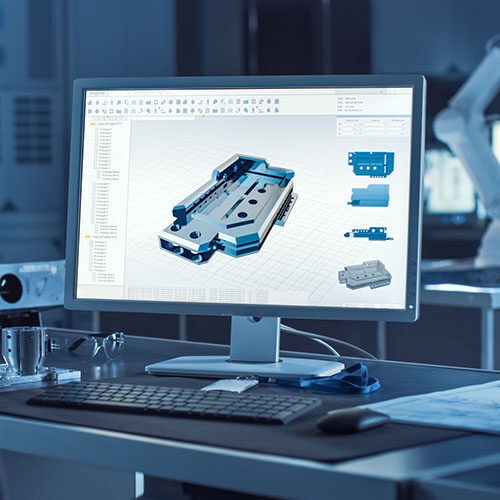
ERP software is an essential tool for manufacturers. However, simply having an ERP system is no longer enough. The most successful manufacturers integrate ERP software into every critical aspect of their operations, making their shops more efficient, more profitable—and always a step ahead of the competition.
From managing complex supply chains to optimizing production processes and meeting customer demands, staying ahead of the competition requires a strategic approach. An Enterprise Resource Planning (ERP) system is a powerful tool that will help you streamline operations, improve efficiency and gain a competitive edge. The key lies in allowing your ERP to operate as the central hub for your entire business, transforming your employees, streamlining operations, enhancing sales, improving communication, and so much more.
Read on to learn how an ERP can transform your manufacturing business and elevate it above the competition.
How can I discover and resolve issues more quickly?
By harnessing the power of ERP, successful manufacturers gain real-time insights into their processes, enabling them to quickly identify and address issues before they escalate. With data-driven decision-making, problems can be proactively tackled, minimizing downtime and maximizing productivity.
How can I seamlessly integrate my processes?
An ERP acts as a central hub that integrates all aspects of a manufacturing business, including inventory management, production planning, finance, sales and human resources. By consolidating data and processes into a unified platform, manufacturers can achieve real-time visibility into their operations, eliminating data silos, reducing manual errors, and fostering collaboration among various departments, leading to enhanced productivity and better customer service.
What are some ways to improve my customer relationships?
Customer satisfaction and loyalty play a vital role in gaining a competitive edge. An ERP with integrated CRM capabilities enables manufacturers to understand their customers better, track sales orders and offer personalized services. By providing exceptional customer experiences, manufacturers can build long-term relationships and secure repeat business, effectively differentiating themselves from their competitors.
How can I better manage my supply chain?
By providing a centralized platform that integrates all supply chain-related processes, an ERP streamlines the flow of information and enables real-time visibility across the entire supply network. With comprehensive data on inventory levels, production schedules and customer demands, manufacturers can make informed decisions and plan effectively.
An ERP system also automates key supply chain tasks like procurement, order fulfillment and logistics, reducing manual errors and improving efficiency. With an ERP, manufacturers can optimize their supply chain and respond more swiftly to market fluctuations to maintain a competitive edge.
What are ways to improve my production scheduling and planning?
Manufacturers are under constant pressure to optimize their production processes and meet tight production schedules. An ERP system helps generate accurate demand forecasts, manages inventory levels and automates production scheduling. With better insights into material availability, workforce capacity and machine utilization, manufacturers can reduce lead times and minimize production bottlenecks.
Can I easily see quality control problems?
A robust ERP system includes comprehensive quality control modules, letting manufacturers monitor quality at every stage of production. By setting up automated quality checks and tracking, defective products can be caught early, ensuring that only the highest standards are met before items leave the factory floor.
ERP systems facilitate robust quality control by tracking raw materials, monitoring production processes and recording product testing data. This data-driven approach enables manufacturers to promptly identify and address quality issues, reduce product defects, and ensure compliance with industry standards and regulations.
How can I improve my compliance and regulatory adherence?
An ERP system helps manufacturers stay compliant by automating documentation, record-keeping and reporting processes. This not only ensures adherence to regulatory requirements but also enhances a business’s reputation as a reliable and responsible partner.
Is it possible to eliminate all the paper on my shop floor?
By fully embracing an ERP, manufacturers can transition to a paperless shop floor environment. With digital documentation, data capture and reporting, efficiency is improved, errors are minimized and the environmental impact is reduced.
An ERP system creates a fully connected and synchronized shop floor environment by using real-time data to instantly align everything and everyone on a shop floor. With complete traceability of production orders and finished jobs, along with instant access to the latest engineering drawings, manufacturers can quickly readjust production plans based on real-time feedback. This enables effective communication of new instructions and priorities to all shop floor personnel. As a result, a shop will run more efficiently, leading to a significant increase in job throughput for manufacturers.
Why is it so difficult to determine which component is increasing my cost of goods sold (COGS)?
ERP software provides comprehensive cost analysis, offering a detailed breakdown of expenses related to various components and processes. By identifying cost drivers and optimizing resources, manufacturers can strategically reduce COGS and enhance profitability.
Manufacturers can achieve cost efficiencies throughout the supply chain by optimizing inventory levels, streamlining procurement processes and reducing waste. Real-time financial insights provided by an ERP enable better financial planning and budgeting, helping businesses allocate resources more effectively and save on costs.
How can I make better and faster decisions about my business?
In a busy manufacturing environment, making quick and well-informed decisions is crucial. An ERP empowers manufacturers with real-time data analytics and reporting tools that offer valuable insights into business performance. This enables management to identify trends, analyze key performance indicators and identify growth opportunities to make better decisions to guide a company forward.
Conclusion
The key to staying ahead of your competition in the manufacturing industry lies in fully leveraging the power of your ERP system. Learn from the best and integrate ERP into every aspect of your business to ensure lasting success in an increasingly competitive marketplace.
Get your eBook Scared to implement a new ERP?
"*" indicates required fields



